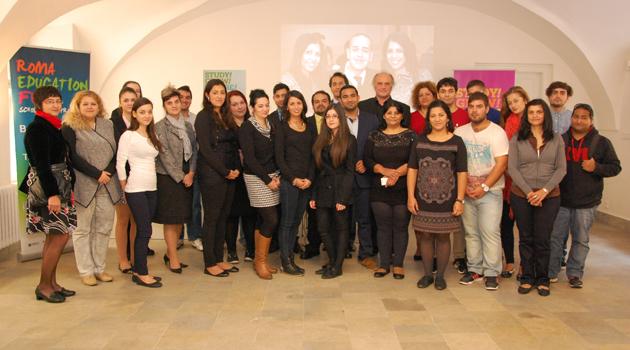Czech Republic: Romani university student was first sent to "special school" as a "gypsy"

Czech daily iDNES.cz reports that even when a six-year-old Romani pupil in the Czech Republic has the good luck not to be automatically assigned into the "practical" schools, a thorny path to a college degree still lies ahead. Romani pupils must overcome more snags in the Czech education system than their non-Romani peers.
The 20 Romani college students receiving scholarships from the Roma Education Fund (REF) who gathered in Prague yesterday definitely know about those snags. "At primary school I was supposed to be transferred into a special school because I was, as they said, ‘a gypsy’. My homeroom teacher fortunately found a way to help me complete regular primary school. I had the good luck not to be thrown overboard," recalls Zdeňka Hečková, who has completed two semesters of distance study in the field of social work at South Bohemian University in České Budějovice.
The support of her family was also important. "Dad was really strict. I am one of 11 children, and he made sure we all completed school. Each of us has been trained in some field today, but I am the only one who managed to get to college," she says.
Not many Romani people are studying at college in the Czech Republic, but in recent years their numbers have rapidly increased. A new generation of the Romani elite is making it to university.
Of course, even Romani college students’ lives are still encumbered by the prejudices of those around them. Studying at university doesn’t stop that.
"I have two children, I’m married, I work, I’m a student and I still encounter prejudice very often. I must constantly prove myself, and even at work I am still pigeonholed as a Romani woman. In the beginning it was rather cruel. My children also encounter this, even though they don’t look Romani – they just encounter it because people know me," Hečková describes.
Student Klaudie Balogová has had similar experiences. "When I transferred from a primary school in Ústí nad Labem that was rather more excluded into a different primary school, they told me and my mother to count on my grades worsening, on my performance declining, but it didn’t. I thrived and have always been an honor student," says the small young woman now in her first semester studying financial management at Jan Evangelista Purkyně University.
"At college I don’t directly encounter prejudice. However, it bothers me that professors often mention Roma during their lectures. For example, a professor will say straight out that Romani people steal. It was the same throughout all of high school. It’s unpleasant," she warns.
Balogová was also lucky that her family had led her toward studying since childhood. "I always had support from my grandparents and parents. Our family places a great emphasis in education," she says.
Number of Romani college students doubles in 10 years
The precise number of Romani college students is not known, as statistics on student ethnicity are not kept by the state. Martina Horváthová of the organization Slovo 21 estimates the number of Romani students in the country at 80 – 100.
"There are more Romani people studying at college today. During the past 10 years their number has definitely grown by 50 %," Horváthová believes.
This year 40 students are included in the REF scholarship program. "Since 2005, 250 students have received a scholarship in the Czech Republic. We have many successful graduates who are completing Master’s programs and some are even going further," says Iva Hlaváčková of the ROMEA organization.
Romani students used to give priority to the fields of education and social studies. The spectrum of their interests, however, is continually expanding.
"Now the fields of economics, the humanities and technology are also leading," Hlaváčková says. The scholarships are not automatically awarded to the Romani students.
"The application process evaluates many criteria. A person’s study results, grade point average, has the most influence. Students also submit, for example, an essay on the topic of their study aims and must meet other criteria. About 60 % of those who apply are supported," she says.
Romani college women in politics
The REF scholarship program is one of the factors helping increase the number of Romani college students. "Without this scholarship it would have been much harder. I live just with my mother, who is a single parent, so it is financially demanding. I would like to pay for a Russian language course, because at school we are required to have two foreign languages," Balogová says.
REF is the only scholarship program in the Czech Republic focused on Romani students. However, young Romani people are also helped to prepare for college by the Slovo 21 organization, for example.
"We recently implemented a year-long training program focused on expanding the horizons and increasing the motivation of Romani college women to enter politics," Horváthová says. During the program the women learn how to work in politics, speak in public, communicate with the media, present arguments successfully and how to prepare a high-quality political campaign.
These women are studying at college, taking a interest in politics, and one day may head into politics themselves. "The Romani minority, like any other, needs to have its own backing and representatives in the highest positions. Romani people have not been represented in decision-making bodies for a long time, but they should figure in them during the creation of policies and strategies," Horváthová points out.
One participant in this year’s training even ran during the recent local elections in the city of Brno. "I have been publicly active for several years, so politics is a logical extension of that," says Alica Sigmund Heráková, a graduate in culture management at Masaryk University; other young Romani women are said to be seriously considering becoming candidates in the future.
The Roma Education Fund
Scholarships from the Roma Education Fund (REF) program are paid to students in 16 countries of Central and Eastern Europe from the private resources of the REF, headquartered in Budapest. Each student receives EUR 800 per year.
Students at private schools have the opportunity to request that part of their tuition be covered and can receive up to EUR 2 000. The aim of the program is to desegregate the education systems of the various countries and increase the number of Romani college students.
Throughout all of Central Europe about 1 500 people are involved in the program annually. In the Czech Republic the scholarship has just been awarded to 40 Romani students.
